Sochi
| Sochi (English) Сочи (Russian) Шъачэ (Adyghe) |
|
|---|---|
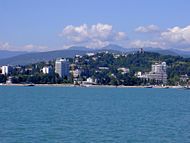 View of Sochi from the Black Sea |
|
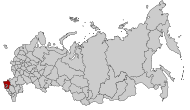 Location of Krasnodar Krai on the map of Russia |
|
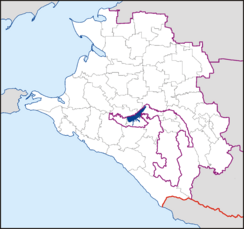 Location of Sochi on the map of Krasnodar Krai
|
|
| Coordinates |
|
| Coat of Arms | Flag |
 |
 |
| City Day: May 1 | |
| Administrative status | |
| Federal subject In jurisdiction of Administrative center of |
Krasnodar Krai Krasnodar Krai — |
| Local self-government | |
| Charter | Charter of Sochi |
| Municipal status | Urban okrug |
| Head | Dzhambulat Khatuov (acting) |
| Legislative body | City Assembly |
| Area | |
| Area | 3,508 km² (1,354.4 sq mi) |
| Population (as of the 2002 Census) | |
| Population - Rank - Density |
328,809 inhabitants 55th 93.7/km² (242.7/sq mi) |
| Events | |
| Founded | 1864 |
| Renamed Sochi | 1896 |
| Town status | 1917 |
| Other information | |
| Postal code | 354000-354999 |
| Dialing code | +7 8622 |
| Official website | |
| http://www.sochiadm.ru/ | |
Sochi (Russian: Сочи, pronounced [ˈsotɕɪ]) is a Russian resort city, situated in Krasnodar Krai just north of the southern Russian border. It sprawls along the shores of the Black Sea and against the background of the snow-capped peaks of the Caucasus Mountains. At 145 km (90 mi), Greater Sochi is claimed to be the longest city in Europe.[1] As of the 2002 Census, it had a population 328,809, down from 336,514 recorded in the 1989 Census. In 2006, the population was estimated to be 395,012.[1] The city has been selected to be the host of the XXII Olympic Winter Games in 2014.[2]
Contents |
History

The Zygii people lived in the area in antiquity. From the 6th to the 11th centuries, the area successively belonged to the Christian kingdoms of Egrisi and Abkhazia who built a dozen churches within the city boundaries. From the 11th to the 15 century it was a part of Georgian Kingdom. The Christian settlements along the coast were destroyed by the invading Gokturks, Khazars, and other nomadic empires whose control of the region was slight. The northern wall of an 11th-century Byzantinesque basilica still stands in the district of Loo.
From the 15th century onward, the area, known as Ubykhia was part of historical Circassia, and was controlled by the native people of the local mountaineer clans of the north-west Caucasus, nominally under the sovereignty of the Ottoman Empire, which was their principal trading partner in the Muslim world. The coastline was ceded to Russia in 1829 as a result of a Caucasian War and Russo-Turkish War, 1828-1829.
The Russians had no detailed knowledge of the area until Baron Fyodor Tornau secretly investigated the coastal route from Gelendzhik to Gagra, and across the mountains to Kabarda, in the 1830s.
In 1838, the fort of Alexandria, renamed Navaginsky a year later, was founded at the mouth of the Sochi River as part of the Black Sea Coastal Line, a chain of fortifications set up to protect the area from recurring Circassian incursions. At the outbreak of the Crimean War, the garrison was evacuated from Navaginsky in order to prevent its capture by the Turks, who effected a landing on Cape Adler soon after.
After the fall of Circassia, and the Russian Massacres against the Circassian tribes in 1864, 90% of the survivors of these tribes were forced to leave Circassia again to the Ottoman Empire with their brother's in faith such as Chechens, Dagistans, Balqars,etc. These massacres were considered the ugliest human genocide against the Circassian/Adyghe people in the 18th-19th Centuries. As a result of these massacres the Circassians became a minority in their historical land Circassia. ("Forgotten Genocide". Circassian World (2008).)
The war over, the bulk of the Circassians who were relocated were deported/forced to leave Circassia and flee to the Ottoman Empire as a result of the massacres they had suffered. This left the littoral area largely depopulated. As the coast was being resettled by Russians, Armenians, and Greeks, the abandoned fort was rebuilt in 1864 under the name of Dakhovsky Posad (as it became known in 1874). In 1896, the burgeoning settlement was incorporated into the Black Sea Governorate and acquired its present name, which was taken from that of the local river. Sochi was granted municipal rights in 1917.
During the Russian Civil War, the littoral area saw sporadic armed clashes involving the Red Army, White movement forces, and the Democratic Republic of Georgia. In 1923 Sochi acquired one of its most distinctive features, a railway which runs from Tuapse to Abkhazia within a mile or two of the coastline. Although this branch of the Northern Caucasus Railway may appear somewhat incongruous in the setting of beaches and sanatoriums, it is still operational and vital to the region's transportation infrastructure.
Sochi was established as a fashionable resort area under Joseph Stalin, who had his favourite dacha built in the city; Stalin's study, complete with a wax statue of the leader, is now open to the public.[3] It was at that time that the coast became dotted with imposing Neoclassical buildings, exemplified by the opulent Rodina and Ordzhonikidze sanatoriums. The centerpiece of an earlier period is Shchusev's Constructivist Institute of Rheumatology (1927-31). The area was extensively developed until the demise of the Soviet Union.
Following Russia's loss of the traditionally popular resorts of the Crimean peninsula (transferred away from the Russian SFSR to the Ukrainian SSR in 1954 by Nikita Khrushchev), Sochi emerged as the unofficial summer capital of the country. During Vladimir Putin's term in office, the city witnessed a significant increase in investment, although many Russian vacationers still flock to the cheaper resorts of neighboring Abkhazia, Ukraine, or to the Mediterranean coast of Turkey.
Additionally, Sochi has also served as the location for the signing of many treaties, especially those between the Georgian, Abkhazian, and South Ossetian governing authorities.
Population
| Year | Total population | Urban population |
|---|---|---|
| 1897 | 1,300 | no data |
| 1926 | 13,000 | no data |
| 1939 | 71,000 | no data |
| 1959 | 127,000 | no data |
| 1979 | 287,300 | no data |
| 1989 | 336,514 | no data |
| 2002 | 397,103 | 328,809 |
| 2006 | 395,012 | 329,481 |
| 2007 | 402,043 | 331,059 |
| Source:[4] | ||
Climate

Sochi has a humid subtropical climate (Koppen climate classification Cfa) at the lower elevations; with winter temperatures rarely falling much below freezing and with the average winter temperature of 6 ℃ (42.8 ℉). The average summer high temperature ranges between 25 ℃ (77 ℉) and 28 ℃ (82.4 ℉) with occasional extreme heat in some interior locations exceeding 40 ℃ (104 ℉). Average annual precipitation is 1,400 mm.[5][6][7]
| Month | Jan | Feb | Mar | Apr | May | Jun | Jul | Aug | Sep | Oct | Nov | Dec | Year |
|---|---|---|---|---|---|---|---|---|---|---|---|---|---|
| Record high °C (°F) | 21.2 (70) |
23.5 (74) |
30.0 (86) |
33.7 (93) |
34.4 (94) |
35.0 (95) |
39.0 (102) |
38.5 (101) |
36.0 (97) |
32.3 (90) |
29.1 (84) |
23.1 (74) |
39.0 (102) |
| Average high °C (°F) | 9.5 (49) |
9.9 (50) |
12.1 (54) |
16.0 (61) |
20.4 (69) |
24.0 (75) |
26.6 (80) |
27.1 (81) |
24.2 (76) |
20.0 (68) |
15.7 (60) |
11.8 (53) |
18.1 (65) |
| Average low °C (°F) | 3.2 (38) |
3.2 (38) |
5.0 (41) |
8.5 (47) |
12.7 (55) |
16.4 (62) |
19.2 (67) |
19.4 (67) |
16.1 (61) |
12.3 (54) |
8.5 (47) |
5.4 (42) |
10.8 (51) |
| Record low °C (°F) | -13.4 (8) |
-15.0 (5) |
-7.4 (19) |
-5.5 (22) |
1.7 (35) |
7.1 (45) |
12.0 (54) |
10.4 (51) |
2.7 (37) |
-3.2 (26) |
-5.4 (22) |
-8.3 (17) |
-15.0 (5) |
| Precipitation mm (inches) | 183 (7.2) |
120 (4.72) |
115 (4.53) |
122 (4.8) |
89 (3.5) |
99 (3.9) |
93 (3.66) |
111 (4.37) |
133 (5.24) |
135 (5.31) |
182 (7.17) |
202 (7.95) |
1,584 (62.36) |
| Source: Pogoda.ru.net[8] 7.09.2007 | |||||||||||||
Layout and landmarks
Sochi is almost alone among larger Russian cities as having the aspect of a subtropical resort. Apart from the scenic Caucasus Mountains, pebbly and sand beaches, the city attracts vacation-goers with its subtropical vegetation, numerous parks, monuments, and extravagant Stalinist architecture. About two million people visit Greater Sochi each summer,[9] when the city is home to the annual film festival "Kinotavr" and a getaway for Russia's elite.
A UNESCO World Heritage Site, the 2,957 km² (730,690 acre) Caucasian Biosphere Reserve, lies just north from the city.[10] Sochi also has Europe's most northerly tea plantations. It is served by the Adler-Sochi International Airport. The Sochi Light Metro is being built, with construction projected to be complete by 2014.
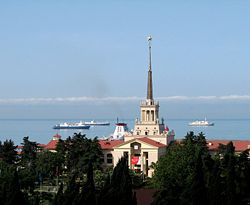

Sochi proper
Central City District, or Sochi proper, covers an area of 32 square kilometers (12.4 sq mi) and, as of 2002 Census has a population of 133,935. The highlights include:
- Michael Archangel Cathedral, a diminutive church built in 1873-91 to Kaminsky's designs in order to commemorate the victorious conclusion of the Caucasian War.
- The red-granite Archangel Column, erected in 2006 in memory of the Russian soldiers fallen in Sochi during the Caucasian War. It is capped by a 7-metre bronze statue of Sochi's patron saint, Michael the Archangel.
- Sochi Art Museum occupies a large building with a four-columned portico, completed in 1939. The elegant Neoclassical design is considered to be the masterpiece of Ivan Zholtovsky.
- Arboretum, a large botanical garden with tropical trees from many countries and the Mayors Alley — the line of palm-trees planted by the mayors of different cities of the world.
- The Winter Theatre (1934-37) is another rigorously Neoclassical edifice, surrounded by 88 Corinthian columns, with a pediment bearing the statues of Terpsichore, Melpomene and Thalia, all three cast by Vera Mukhina.
- The Maritime Passenger Terminal (1955) is notable for its distinctive 71-metre-high steepled tower and four statues symbolizing the cardinal points.
- The Railway Terminal Station (1952) is probably Sochi's most familiar building, being the first landmark seen by visitors on approach to the city. It is a remarkable example of Stalinist architecture.
- The Riviera Park was established by Aleksey Khludov's son in 1898 in the part of the city which later became known as Khludovskaya. The park is popular with tourists and local residents alike. It has a variety of attractions, including an outcrop of funny statues and a "glade of friendship" where magnolia trees were planted by every Soviet cosmonaut, among other notables.
- The Tree of Friendship is a lemon tree planted by Otto Schmidt in 1934. Multiple cultivars from foreign countries were grafted onto this tree as a token of friendship. The associated museum boasts a collection of 20,000 presents from all over the world.
Lazarevsky City District


Lazarevsky City District lies to the north-west from the city centre and has a population of 63,239 people (2002 Census). It is the largest city district by area, covering some 1,744 square kilometers (673.4 sq mi) and comprising several microdistricts:
- Lazarevskoye, 59 km from the downtown core, contains a delphinarium, an old church (1903) and a new church (1999). The settlement was founded as a Russian military outpost in 1839 and was named after Admiral Lazarev.
- Loo, 18 km from the city centre, was once owned by Princes Loov, a noble Abkhazian family claiming patrilineal descent from King Anos, whose royal title was sanctioned by Emperor Heraclius in 623 AD. The district contains the ruins of a medieval church, founded in the 8th century, rebuilt in the 11th century, and converted into a fortress in the Late Middle Ages.
- Dagomys, 18 km from the city centre, has been noted for its botanical garden, established by order of Nicholas II, as well as tea plantations and factories. A sprawling hotel complex was opened there in 1982. Dagomys adjoins Bocharov Ruchey, a dacha built for Kliment Voroshilov in the 1950s, but later upgraded into a country residence of the President of Russia, where he normally spends his vacations and often confers with leaders of other states.[11]
- Golovinka is a historic location at the mouth of the Shakhne River. Formerly marking the border between the Ubykhs and the Shapsugs, the settlement was noted by Italian travellers of the 17th century as Abbasa. On 3 May 1838, it was the site of the Subashi landing of the Russians, who proceeded to construct Fort Golovinsky where many convicted Decembrists used to serve. The fort was intentionally destroyed by Russian forces at the beginning of the Crimean War, so as to avoid its capture by the enemy.
- Fort Godlik, of which little remains, had a turbulent history. It was built at the mouth of the Godlik River in the Byzantine period (5th to 8th centuries), was destroyed by the Khazars and revived by the Genoese in the High Middle Ages.
Khostinsky City District
Khostinsky City District, sprawling to the south-east from the city centre, occupies approximately 374 square kilometers (144.4 sq mi), with a population of 62,515 (2002 Census). The district is traversed by many rivulets which give their names to the sub-districts of Matsesta ("flame-coloured river"), Kudepsta, and Khosta ("the river of boars"):
- Matsesta has been a spa since 1902. A 1,316-metre long tunnel, constructed between 1996 and 2000, connects it to Khosta and Sochi proper. The area does not retain many marks of antiquity, although the eponymous river was noted as Masaitica as early as 137 AD, in a letter from Arrian to Emperor Hadrian.
- Kudepsta is another seashore resort, notable for the Vorontsov Caves, stretching for some four kilometers away from the shore. There are fourteen entrances to the caves. The largest hall has a length of twenty meters.
- Khosta is an old village, attested in medieval documents as Casto and Khamysh. It contains the ruins of a medieval church, going back to the 14th century, and the comparatively modern Transfiguration Church, consecrated in 1914. Khosta has an array of tourist attractions:
- Khosta Fortress, or rather the ruins thereof, perched on the top of a 100-metre high cliff within six kilometers from the sea coast.
- The fortress stands on the grounds of an ancient grove of yews and boxwood, which may be up to 30 mya old. The largest yews attain a height of 50 metres; some are estimated to be 2,000 years old. The grove covers an area of 301 ha and has been affiliated with the Caucasian Biosphere Reserve since 1931.
- The Akhun massif comprises Greater Akhun Mtn. (663 m), Lesser Akhun Mtn. (501 m), and Eagle Bluff (380 m). Greater Akhun is crowned by a Neo-Romanesque limestone tower (1936) that offers glimpses of Pitsunda and Gagra across the border in Abkhazia. There is also a chain of twenty karst caves in the massif.
- The Sochi Arboretum, which goes back to 1889, possesses the most comprehensive collection of subtropical flora in Russia, including 76 species of pine, 80 species of oak, and 24 species of palm.
- The Summer Theatre is a rather ordinary Neoclassical structure, erected in 1937 and extensively renovated in 2001.
Adlersky City District
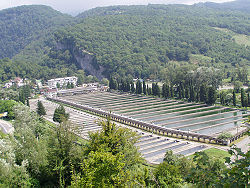
Adlersky City District, with an area of 1,352 square kilometers (522 sq mi) and a population of 69,120 people (2002 Census), is the southmost district of the city, located just north of the border with Abkhazia. Until the establishment of Greater Sochi in 1961, it was administered as a separate town, which had its origin in an ancient Sadz village and a medieval Genoese trading post.
Among the natural wonders of the district is the Akhshtyr Gorge with a 160-meter-long cave that contains traces of human habitation from about 30,000 years ago. The upland part of the district includes a network of remote mountain villages (auls), the Estonian colony at Estosadok, and the ski resort of Krasnaya Polyana which will host the events (Alpine and Nordic) of the 2014 Winter Olympics.
Also located here are the largest trout fishery in Russia (founded in 1964) and a breeding nursery for great apes.
Sports facilities
Sochi is also known for its sport facilities: a local tennis school spawned the careers of such notable players as Grand Slam champions Maria Sharapova and Yevgeny Kafelnikov (Kafelnikov spent much of his childhood here, while Sharapova relocated to Florida at the age of 7). In late 2005, the Russian Football Union announced that it was planning to establish a year-round training centre for the country's national teams in Sochi. The city's warm climate was cited as one of the main incentives.
2014 Winter Olympics
In June 2006, the International Olympic Committee announced that Sochi had been selected as a finalist city to host the 2014 Winter Olympics. On July 4, 2007, Sochi was announced as the host city of the 2014 Winter Olympics, edging out Pyeongchang, South Korea, and Salzburg, Austria.[12]
This will be Russia's first occasion to host the Winter Olympic Games. Under the rule of the Soviet Union, Alpine skiing was considered by the ruling party to be a bourgeois and decadent sport and nobody had any Alpine skiing facilities in Russia or anywhere else. Locations like Sochi did not even apply to be the location of the Winter Olympics, and no athletes from the Soviet Union entered the Alpine skiing events. As for the Soviets, their entries in the Winter Olympics were cross-country skiing, speed skating, figure skating, and ice hockey. Hence, the Alpine skiing facilities in the former Soviet Union states are generally poor. They do not have the ski-resort tradition of places like Switzerland, Austria, France, Italy, Norway, the United States, Canada, and Japan, all of which have hosted or will host the Winter Olympics on more than one occasion.
The site of a training center for aspiring Olympic athletes, as of 2008, Sochi has no world-class level athletic facilities fit for international competition. [2] To get the city ready for the Olympics, the Russian government has committed to a $12 billion investment package,[13] shared 60-40 between the government and private sector.[14] By some estimates, the investments necessary to bring the location up to Olympic standards may exceed that of any previous Olympic games. [3]
Environmental impact
"Sadly, the Olympic bid is being used as a way for construction companies simply to get their hands on the most valuable land," Greenpeace Russia’s Mikhail Kreindlin said.[11] "The last time the Russian government looked at this issue, which was in January, 2007 they made no mention of the Olympic bid. They simply said that the land could be used for social infrastructure, whereas it was patently obvious that it would be snapped up by elite resorts and golf clubs [with] nothing to do with the Olympics." Putin had apparently chided construction firms working round-the-clock to get Sochi up to ready, the St. Petersburg Times reported.[15] "It would be a huge mistake not to take into account what the environmental organizations think", said Putin. "We are going to make sure that builders maintain contact with" environmentalists, who had voiced concerns about the work’s impact on the Sochi National Park, in Western Caucasus.
Greenpeace Russia had told the US-funded Radio Liberty[16] on 12 September 2006 that it wanted to prevent construction work inside a national park, which it said would break Russia's environmental protection laws.
Construction work

The state-controlled RAO UES announced in July 2007 that it might spend 30 billion roubles (about US$1.2billion) on upgrading the electrical power system in the Sochi area by 2014.[17] The power generating companies Inter RAO UES and RusHydro would have to build or modernize four thermal power plants and four hydroelectric plants — and the federal grid company FGC UES has to replace the Central-Shepsi electricity transmission line, which reportedly often fails in bad weather. The new power line would run partly on power towers and partly across the bottom of the Black Sea. By 2011, the power supply of the resort area would increase by 1129 MW — of which 300 W would be used for Olympic sports facilities “The cost of the work is estimated at 83.6 billion roubles (about US $3.26 billion), of which 50 billion roubles (about US$2 billion dollars) will go to investments in the electricity grid,” power company announced. They did not say how much of the bill the state would foot. In February 2007, when UES had planned to spend 48.8 billion roubles (about US$1.9 billion) on the Sochi area, the share the state had been ready to pay had been 38 billion roubles (about US$1.48 billion) of that.
The coming of 2014 Olympics also urges the construction of a medium capacity rapid transit system, the Sochi Light Metro. The current alignment would connect the Sochi Olympic Village, Sochi International Airport, two major railway stations of Northern Caucasus Railway, the downtown of Sochi, and the Alpine skiing area Krasnaya Polyana.
Notable people from Sochi
- Yuri Nikolaevich Denisyuk - Physicist, one of the founders of holography
- Andre Geim - Physicist, inventor of graphene
- Yevgeny Kafelnikov - tennis player
- Boris Nemtsov - former Deputy Prime Minister of Russia
- Mordechai Spiegler - 1970s Russian-Israeli football player and manager.
Sister cities
Sochi has been twinned with the following cities:
|
|
See also
- Tuapse and Gelendzhik - Russian coast towns immediately to the north
- Gagra and Pitsunda - adjacent resorts in Georgia
- Sochi International Airport
References
- ↑ Port of Sochi at Russia.com. Retrieved on July 7, 2007.
- ↑ Sochi hosts 2014 Winter Olympics. BBC, 4 July 2007.
- ↑ Stalin's ghost haunts Black Sea hotel at Mail & Guardian Online. Retrieved on July 7, 2007.
- ↑ Population of Russian Federation by cities, towns, and districts as of January 1, 2007: Rosstat. - Moscow, 2007
- ↑ Great Soviet Encyclopedia. Entry on Sochi (Russian)
- ↑ V. A. Drozdov, O. B. Glezer, T. G. Nefedova and I. V. Shabdurasulov (1992). Ecological and geographical characteristics of the coastal zone of the Black Sea. GeoJournal 27.2, 169-178.
- ↑ Elena A. Rybak, Oleg O. Rybak and Yuri V. Zasedatelev (1994). Complex geographical analysis of the Greater Sochi region on the Black Sea coast. GeoJournal 34.4, 507-513.
- ↑ "Pogoda.ru.net" (in Russian). Retrieved on September 7, 2007.
- ↑ "Сочи, Пхенчхан и Зальцбург — претенденты на Олимпиаду-2014" (in Russian), ITAR-TASS (2007-07-04). Retrieved on 2007-07-09.
- ↑ Western Caucasus at Unesco Heritage Site and Google Maps search for Sochi near 44°N 40°E. Retrieved on July 7, 2007.
- ↑ 11.0 11.1 Radio Free Europe/Radio Liberty: Russia: Environmentalists Oppose Sochi's Olympic Bid. Retrieved on July 7, 2007.
- ↑ International Olympic Committee (2007-07-04). "Sochi Elected as Host City of XXII Olympic Winter Games". Retrieved on 2007-07-04.
- ↑ sportsline.com: Sochi, Russia wins, awarded 2014 Winter Olympics
- ↑ Iht.com: Sochi Olympic bid organizers says venue projects conform to environmental norms, federal law. Retrieved on July 7, 2007.
- ↑ The St. Petersburg Times: Putin Takes to Slopes to Back Olympic Bid. Retrieved on July 7, 2007.
- ↑ Radio Free Europe/Radio Liberty: Sochi Olympic Bid Faces Greenpeace Challenge. Retrieved on July 7, 2007.
- ↑ Kommersant: Power Supply to Be Stepped Up to Sochi by 2014. Retrieved on July 7, 2007.
- ↑ Official website of Cheltenham
- ↑ Website of the President of France
- ↑ Official website of Rimini
- ↑ Official website of Espoo
- ↑ Sister Cities information obtained from Sister Cities International, Inc. (SCI)]. Retrieved on July 5, 2007.
- ↑ 23.0 23.1 23.2 Official website of Sochi (international). The page spotlights similarities of the twin towns to Sochi in that all of them are "summer resorts".
- ↑ "Греческий Волос и российский Сочи стали городами-побратимами", Interfax (2007-05-26). Retrieved on 2007-07-08.
External links
Other
- Sochi Club - online guide to Sochi - Info and Entertainment
- Sochi City Portal - Info and Entertainment
- Forums Sochi City - Info and Entertainment
- Sochi on Google maps
|
||||||||||||||
|
|||||